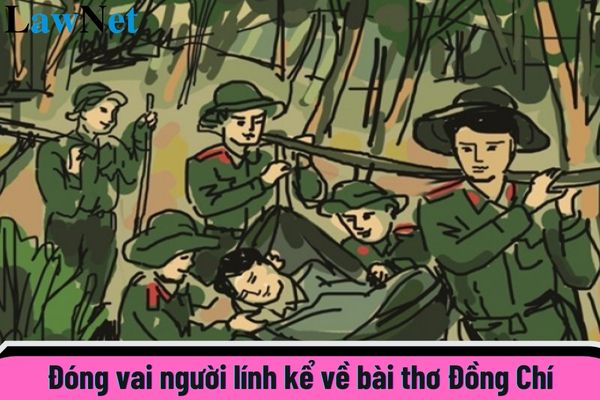What is the sample essay on recounting Chinh Huu's poem "Dong Chi" via a soldier's statement? What literary knowledge does the 9th-grade Literature curriculum in Vietnam cover?
What is the sample essay on recounting Chinh Huu's poem "Dong Chi" via a soldier's statement?
Students may refer to the following sample essay on recounting Chinh Huu's poem "Dong Chi" via a soldier's statement:
|
Sample essay on recounting Chinh Huu's poem "Dong Chi" via a soldier's statement I am a soldier during the resistance war against the French, and Chinh Huu's poem "Dong Chi" captures the emotions, the memories that my comrades and I experienced during the fighting days. |
*Note: Information is for reference purposes only./.

What is the sample essay on recounting Chinh Huu's poem "Dong Chi" via a soldier's statement? What literary knowledge does the 9th-grade Literature curriculum in Vietnam cover? (Image from Internet)
What literary knowledge does the 9th-grade Literature curriculum in Vietnam cover?
According to Section 5 of the General education program in Literature issued with Circular 32/2018/TT-BGDDT, the literary knowledge in the 9th-grade Literature curriculum in Vietnam includes:
- Imagination in literary works
- Titles and how to title a text
- Topics and themes, how to identify themes; structure
- Plot, setting, characters, language in comedy, historical stories
- Single-threaded and multi-threaded plots
- Main artistic methods of satirical poetry
- Some formal elements of eight-line verse and Tang poetry: composition, rules, rhyme, rhythm, parallelism
- Some formal elements of a poem: words, images, structure, emotional flow
- Conflict, action, character, dialogue, and satirical methods in literary drama (comedy)
- Some formal elements of free verse (six, seven words): number of lines, words, rhyme, rhythm
- The reader and individual reception of a literary text
- Content reflection and the author's perspective on life and people.
What is the core content of the Literature subject in Vietnam?
According to the Appendix issued with Circular 32/2018/TT-BGDDT regarding the Literature subject in the general education program:
- Literature is a subject in the field of Language and Literature Education, taught from grade 1 to grade 12. At the primary education level, this subject is called Vietnamese; at the lower and upper secondary education levels, it is called Literature.
- Literature is an instrumental and aesthetic-humanistic subject; it provides students with the means to communicate, serves as a foundation for studying all subjects and educational activities; it is also a vital tool in educating students on high cultural, literary, and national linguistic values, fostering healthy emotions, humanitarian sentiments, benevolent, altruistic living,...
- Through linguistic texts and vivid artistic imagery in literary works, via reading, writing, speaking, and listening activities, Literature plays a substantial role in helping students form and develop good qualities as well as core competencies to live and work effectively and to engage in lifelong learning.
- The content of Literature is comprehensive, encompassing cultural knowledge, ethics, and philosophy,... related to various subjects and educational activities such as History, Geography, Arts, Civic Education, Foreign Languages, Natural and Social Sciences, Experiential Activities, Career Orientation,... Literature closely relates to life; it helps students pay attention to and connect with everyday life, relate, and possess problem-solving skills for real-world issues.
- The core content of the subject includes fundamental, essential knowledge and skills about Vietnamese and literature that meet the required standards of student qualities and competencies at each educational level; it is divided into two phases: the basic education phase and the career-oriented education phase.
Thus, the core content of the subject includes fundamental, essential knowledge and skills about Vietnamese and literature that meet the required standards of student qualities and competencies at each educational level.

